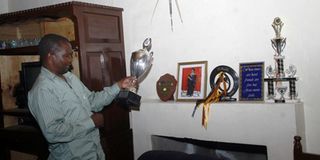Theatre fraternity mourns Barnabas Kasigwa’s death

A mourner admires one of the trophies won by the late Barnabas Nyambwani Kasigwa, a renowned drama teacher, at Kasigwa's home in Nakuru. Kasigwa died on Saturday, August 17, 2014, after a long battle with cancer. PHOTO | SULEIMAN MBATIAH | NATION MEDIA GROUP
What you need to know:
- Kasigwa revolutionised school plays with his often well-thought-out masterpieces.
- Various schools that he coached, among them Kaaga Girls and Moi High School Kabarak, often scooped national awards.
- He was one of the founders of the Kenya Schools National Drama Festival Association (KNDFA).
- Mr Kasigwa also served as the first African chairman of the Nakuru Players’ Theatre.
Drama teacher Barnabas Nyambwani Kasigwa’s death has shaken the theatre fraternity in the country to the core.
Kasigwa was well known in schools, colleges and the commercial theatres, where his works are revered.
Kasigwa, a national icon by any standards, revolutionised school plays with his often well-thought-out masterpieces that saw various schools that he coached scoop national awards.
Notable among them are Kaaga Girls and Moi High School Kabarak.
Mwalimu, as he was fondly known, died on Saturday after a long battle with cancer.
Mr Kasigwa was an English literature teacher and drama director at Moi High School, Kabarak, and at Kabarak University.
He was one of the founders of the Kenya Schools National Drama Festival Association (KNDFA) and was also an award-winning playwright, director and author of repute with an array of books under his name.
Among them is an Anthology of East African Plays, published by Longman Kenya Limited, which he compiled in 1991.

The late drama teacher Barnabas Nyambwani Kasigwa. He served as the first African chairman of the Nakuru Players’ Theatre.
WINNING PLAYS
It is a collection of all his winning plays dedicated to readers and performing artists.
Mr Collins Oduor, the chairman of the Nakuru Players Theatre, enumerated Kasigwa’s contribution to commercial theatre arts that saw Nakuru’s talented youth gain employment as artistes on stage and in the production of plays.
Mr Kasigwa also served as the first African chairman of the Nakuru Players’ Theatre, which was owned by white settlers in the pre-independence days.
Mr Oduor recalls one of his greatest plays, titled Joseph and the Amazing Dream Coat, a biblical play he wrote in early 2000.
The musical play, which enjoyed good reviews and full-house attendance during its performances, tells the story of how Joseph was sold into slavery by his jealous brothers, and then rose to become the second most powerful man in Egypt after Pharaoh.
In his latest publication, Ambivalence of Life and Death, Mr Kasigwa analysed how playwright John Ruganda uses death as a leading motif in drama.
The book also focuses on the various concepts of death from the Christian and African traditional perspectives and the fear that comes with it.
Among the awards he won were the Nation Media Group Award for best artistic director in 2002 and 2004, the Ford Foundation Award for women empowerment and girl-child rights (2006), the Kenya Bureau of Standards award for devoted leadership in quality production during the Kenya National Drama Festival (2008) and the Kenya Secondary Schools Heads Association Teacher of the Year Award (Rift Valley Province 2009) for effort, commitment and dedication to the teaching service.





